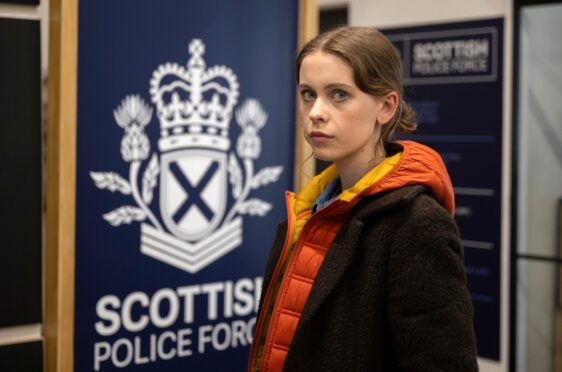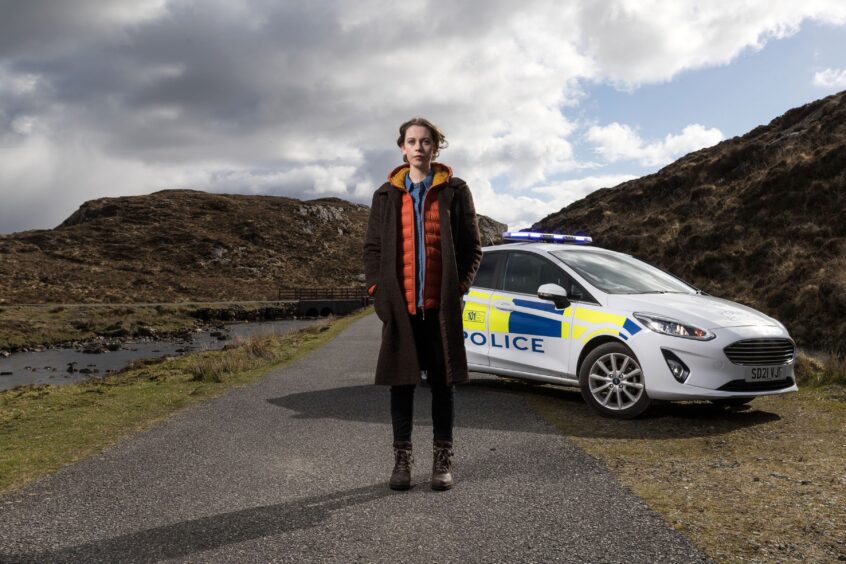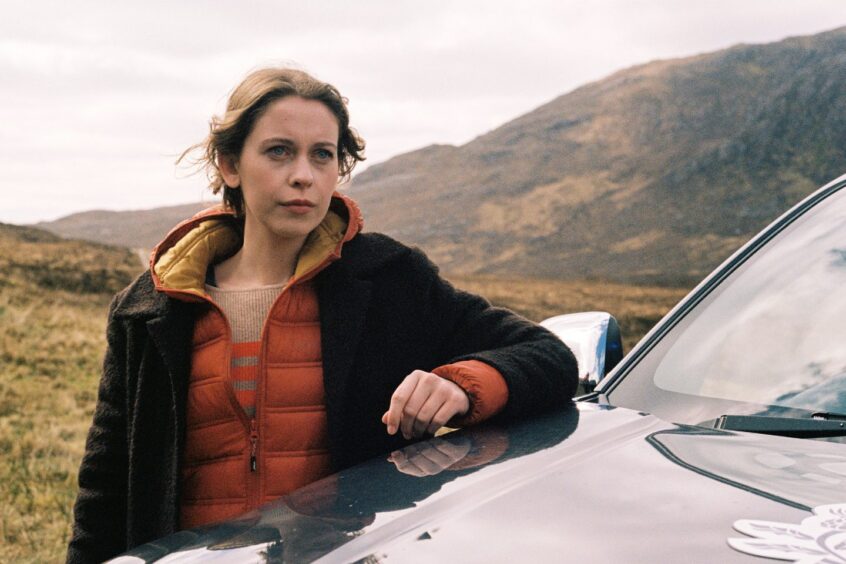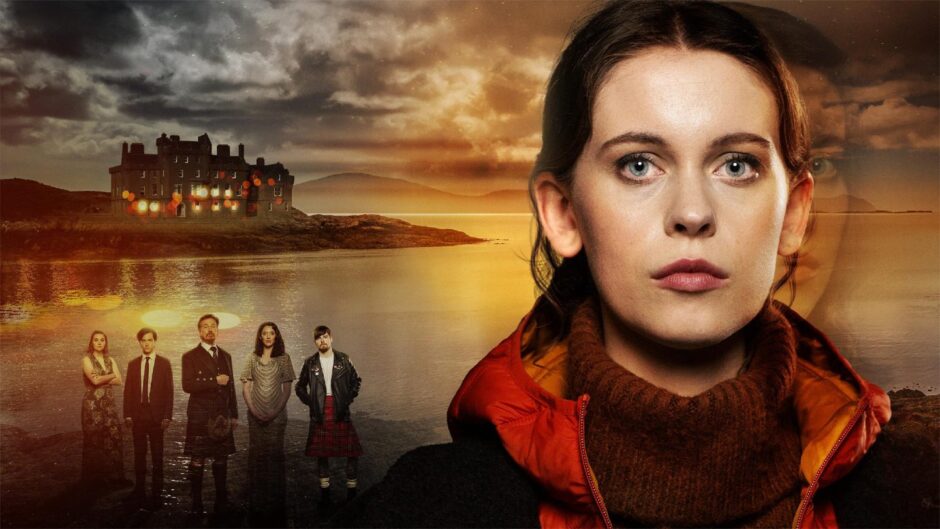
Sorcha Groundsell’s large blue eyes are set in a small, elfin face, giving her features a naturally expressive quality.
There’s something of old Hollywood about her, a Clara Bow-like presence that wordlessly pulls the eye whenever she’s on screen. It seems inevitable that she would become an actress, but it wasn’t always the life Sorcha planned for herself.
“I sort of didn’t really know I wanted to be an actor,” said Sorcha, thoughtfully. “I was pursuing more science-y careers, but I wasn’t very happy. Then I woke up one day and was like, ‘oh, acting’. It sounds like hyperbole, but it wasn’t. It still mystifies my parents – it still mystifies me!”
Sorcha was born in England but grew up on the Isle of Lewis. She moved to Glasgow as a pre-teen with her family, took acting lessons and left school aged 16 in the hopes of earning some money to get through drama school. She started picking up small acting jobs for experience, and one role led to another, starring in shows like Clique, Shetland, Crime, The Innocents and His Dark Materials. Ten years later, she still hasn’t made it to drama school.
Sorcha said: “I was fortunate because I entered the industry when a lot of hard work had already been done in improving roles for women. I think young actors like me were starting to see the benefits and there was a huge explosion of not just strong female characters, but female leads with depth and flaws and purpose. I’ve definitely been able to reap the benefits of that.”
An t-Eilean
Her latest role in BBC Alba’s An t-Eilean (The Island) was created in this new, multifaceted mould. Sorcha plays Kat Crichton, a young Family Liaison Officer assigned to investigate the brutal murder of the wife of a local tycoon on a remote Scottish island. As the drama unfolds, Kat must also confront her own past, and face the traumatic experience that made her flee the same island 10 years before.
Sorcha said: “The series follows in the footsteps of a lot of the really brilliant Scandinavian crime shows. The bulk of the drama follows the police investigation, but it’s also got these interesting deep family relationships running through that are part of the mystery.
“At the beginning, my character, Kat, is quite reserved and holding a lot back, but there’s something simmering under the surface with her. As the show goes on, you learn more about her history and how it relates to the murder itself, and the people involved.
“She’s someone who holds her cards close to her chest but has a deep well of emotion and darkness that she holds back, which, as an actor, there’s nothing better than that. It’s great when you get a character who functions on a certain level in the world but has so much depth hiding underneath.”
Sorcha has played her fair share of wide-eyed ingenues in her time but is now getting the chance to sink her teeth into meatier roles – something she believes has only come with age.
She explained: “I’m 26 now, and I’m ageing out of those younger roles. There’s incredible value in those ingenue characters, but for me, it’s never really been my interest. Even as a viewer, I don’t particularly gravitate towards those roles. And as I get older, the parts are changing slightly, which in my experience has been a good thing.
“I’ve got quite a few actor friends who are older and female, and they are a thousand times more interesting to me as performers. I think I’ve always felt that people generally, in any job or walk of life, only get more interesting as time goes on, and that naturally translates into acting too. You’re going to be more interesting as a performer at 60 because you’ve got decades more life experience and decades more to communicate and more tools available to you.”
Performing in Gaelic
The role of Kat in An t-Eilean came along at the perfect time for Sorcha – not only did it let her grapple with a complex character, but it also allowed her to return to Scotland and perform in Gaelic, something she has always wanted to do.
She said: “It was the perfect job at the perfect time. I couldn’t have asked for a better role or better production if I had wished for it directly. I’ve wanted to work in Gaelic for so long, but I never found an opportunity or felt like the right thing had come along.
“But An t-Eilean had such great scope and offered a really fantastic role, and it was an obvious yes. It was the best entrance into working in Gaelic that I could ever have.”
Sorcha learned Gaelic at school while growing up on Lewis and continued at Glasgow Gaelic School when she moved to the city. She’s glad that there seems to be more interest in indigenous languages lately, and that high-end productions like An T-Eilean can happen in Gaelic.
She said: “My mum’s side of the family are from the Isle of Lewis, but she didn’t grow up speaking Gaelic. In my grandparents’ generation it was kind of frowned upon and not encouraged. There was a perception that came from the outside that Gaelic wouldn’t serve you in life, and so it would be better for your children if you didn’t teach them how to speak it.
“I think my generation are really seeing the damage that was done by that and taking up the mantle and re-embracing and re-finding the language and culture. A lot of us working on the show have Gaelic in our lives but never necessarily had the chance to work in it.
“It was a fantastic opportunity for us to feel like we had a place in the Gaelic world and that, for all of us who have a connection with the language, the only way it will survive is if all of us take up the mantle and keep pushing and trying and looking for opportunities. If we all think, ‘I can’t do that, my Gaelic isn’t good enough’, then the language will die. It was really inspiring to be part of this movement of people.”
Creative community
While working on the programme, Sorcha was introduced to a community of Highland and Islands filmmakers that she immediately clicked with. They have already collaborated again on a short film about the Brahan Seer (Coinneach Odhar in Gaelic) and his final prophecy, for which Sorcha stepped into a producing role.
“I’ve been interested in producing for a long time. I think anyone who knows me would say I’m pretty bossy, and that I often think I know best. So, in a way, moving into producing is a natural fit,” she laughed. “We finished filming just before Christmas. It’s a folk horror story about Coinneach Odhar’s final prophecy which ultimately led to his very dramatic death.
“It was a story that had been fascinating to all of us for a long time, and it seemed like such a cinematic subject. It was a really great project to work on as a producer for the first time.”
For Sorcha, it’s an incredibly exciting time to be a Scottish creative. She said: “With Scottish people all over the world, there’s an incredible shorthand we have that makes every experience, certainly in my life, more enjoyable.
“I think there’s huge potential that is slowly beginning to be tapped in Scottish creativity and Gaelic creativity specifically. I feel we’ll see more and more coming out of Scotland, in particular the Highlands and Islands, because it has been underutilised and undervalued for so long.”
‘I’m not built for city life’
Sorcha moved to London when she was 18 years old to pursue her acting career, but she always feels the magnetic pull of the Scottish islands.
“I find that I can only manage three or four months in London before I need to come home for a bit,” said Sorcha. “My parents moved back to the islands and I think I’m not really fully built for city life. I think four months is my maximum before I need to come back and see the sea and take a breather. It’s an incredible privilege to be able to experience the value of both. I can come home and see what community means and what the value of nature really is and have a sense of belonging, and then London fills up all the other things.”
For Sorcha, returning home helps her recharge her creative batteries.
She explained: “I think it helps with acting, but I think it helps with your brain generally.
“City life is very stimulating, and that can easily slip into overstimulation. I find that there’s more space in my mind when I’m in the countryside, and that lends really well to creativity. I think if you can slow your heart rate down and slow your pace of existence enough to actually see what is banging around in your brain, then you’ll have more access to creativity. That’s my experience anyway!”
An t-Eilean, Tuesday, BBC Alba, 9pm

Enjoy the convenience of having The Sunday Post delivered as a digital ePaper straight to your smartphone, tablet or computer.
Subscribe for only £5.49 a month and enjoy all the benefits of the printed paper as a digital replica.
Subscribe © Supplied by BBC
© Supplied by BBC © Black Camel Pictures/BBCAlba/John Murdo MacAulay
© Black Camel Pictures/BBCAlba/John Murdo MacAulay © Supplied by BBC
© Supplied by BBC